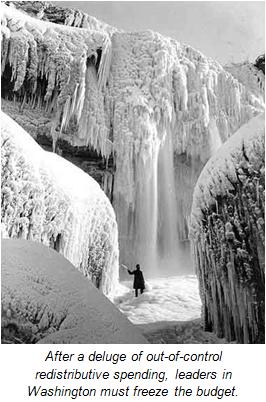By Isaac MacMillen
“The problem with socialism is that you eventually run out of other people’s money.”
—UK Prime Minister Margaret Thatcher
“Maggie” Thatcher was correct when she astutely observed that redistribution of wealth is ultimately doomed to failure. The problem, of course, is that government can only redistribute so much wealth until there is none left to redistribute. Then, it is simply, in the words of Churchill, socialism “redistributing scarcity.”
Yet when people think of socialism, they usually think of the redistribution occurring from inside the government out. The authorities tax the rich to give to the poor. Such a view, however, misses many of the other forms under which socialism can masquerade, each as nefarious in and of its own right.
One such way is currently progressing totally unimpeded in Washington, where the Obama administration has effectively redistributed trillions, converting it into government spending while making believe taxation plays no part.
First there was the nearly $800 billion pork-laden “stimulus.” Next, the $410 billion omnibus spending bill—though it is facing opposition in the Senate. Treasury Secretary Geithner proposed an additional $2.5 trillion to help ‘stabilize’ private industry. Finally, the proposed $3.6 trillion budget—with its massive increase in spending, and let’s not forget the $750 billion in the budget set aside for another TARP-like program, “just in case.”
The grand total: $7.3 trillion, much of it intended to ‘help’ the economy. In essence, spending that should have taken place at the private level is taking place at the public level, depriving the free markets of dollars that would have made a major difference in this economic climate.

House Minority Leader John Boehner (R-OH) is trying to put a stop to the ever-increasing government spending. Citing high unemployment numbers, he proposes a spending freeze at the federal level. In a letter to Speaker Pelosi, co-signed by Whip Rep. Eric Cantor (R-VA), Conference Chair Rep. Mike Pence (R-IN) and Policy Committee Chair Rep. Thaddeus McCotter (R-MI), Rep. Boehner states:
“At a time of record deficits, a freeze would allow the federal government to keep functioning at current spending levels without requiring beleaguered taxpayers to pay for new spending increases. Congress could ensure that essential government functions are carried out without any cuts while still protecting taxpayers from spending increases during a time of economic hardship.”
Unfortunately, even if spending were to freeze (extremely unlikely even if Republicans were in control—they didn’t do it as the “Do-Nothing Majority” a decade ago), the American taxpayers would still have to pay—either through taxes or inflation—for the ill-thought-out ‘bailouts’ and ‘stimulus’ bills, which could cost trillions. He continues:
“Our nation now faces the highest deficit in history, and we are plunging further into uncharted territory with the anticipated debt nearly doubling the previous record levels as a percentage of GDP.”
About that he is certainly right. And while Rep. Boehner’s intentions are admirable—indeed, if accomplished, they would represent perhaps the greatest show of restraint from Congress in the past century—the gravity of the situation demands far more action. Already the deficit is so high, and the country in so much debt, that nothing less than a wholesale rolling back of multiple government programs can help offset the dire economic problems that America will face in the future.
As ALG News reported last week, the nation’s assets and liabilities are roughly equal ($56.5 trillion and $56.4 trillion, respectively). If government decided it wanted to pay it off now, it would be necessary to bankrupt the country—levying a 100% tax on income, property, and luxury. Hence, adding even more trillions to the deficit is simply not an option if the nation wishes to ever lift itself out of the pit of debt. And freezing spending, while far superior to continuing on the present course, will only postpone the inevitable.
Washington must embark on a massive spending cut if it wishes to weather this storm—and come out ahead. Unfortunately, that seems about as likely as a pig flying through a frozen hell on a month of Sundays. And in the meantime, under the Obama administration and a Democratic-controlled Congress, the government will continue to expand its spending reach, denying the private sector the dollars it urgently needs—and would spend much more efficiently. Instead, the government expands while the private sector shrinks. And eventually, as taxpayers and businesses lose their wealth-creation abilities, the federal government will run out of money.
On that day, Margaret Thatcher’s prophecy will have come true. We will “run out of other people’s money”—and one day soon, there won’t even be any scarcity left to redistribute.
Isaac MacMillen is a Contributing Editor of ALG News Bureau.

